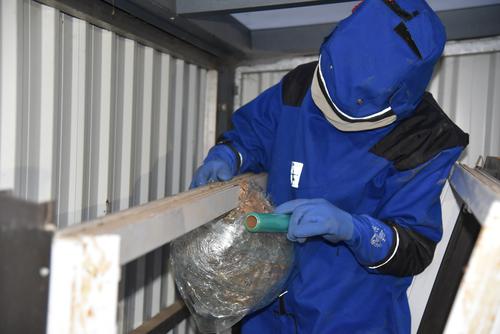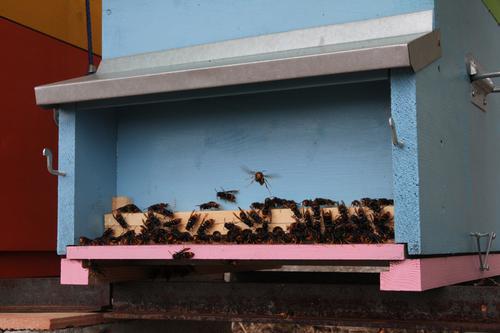What is the issue?
Why is the Asian Hornet a problem?
The hornet is not native to Belgium. It’s an ‘exotic’ species.
The Asian hornet originates from Southeast China. It hitchhiked accidentally on a shipment of Chinese materials.
It established itself in South France in 2004. From there, it expanded its range at a rate of 60-100 km per year. Meanwhile, the species is established in Western and Central Europe. In 2011, it reached Picardy and Nord-Pas-de-Calais.
The hornet in Belgium
The first hornet was spotted in Belgium in 2011 in Flobecq.
In November 2016, schoolchildren discovered the first nest in Guignies. Pest controllers removed that nest, but it’s likely that some mated queens escaped.
In Flanders, specialists destroyed the first nest in the fall of 2017, in Poperinge. Meanwhile, the species has spread throughout Flanders.
 Specialist exterminating the first nest of Asian hornets on Belgian soil in Poperinge. 11/22/2018 (Photo: HBV)
Specialist exterminating the first nest of Asian hornets on Belgian soil in Poperinge. 11/22/2018 (Photo: HBV)
Impact on Honeybees and nature
Asian hornets hunt honeybees in groups at the entrance of beehives. They are predators that also use other insects as food. Honeybees are not adapted to this new enemy and cannot defend themselves.
The fewer honeybees there are, the more the Asian hornet preys on wild pollinators. In French urban areas, 66% of their diet consists of honeybees. In forest and agricultural areas, it drops to 35%.
 Asian hornets hunt honeybees in groups and can sometimes be very numerous around beehives (Photo: S. Lioy, Life Stopvespa).
Asian hornets hunt honeybees in groups and can sometimes be very numerous around beehives (Photo: S. Lioy, Life Stopvespa).
The Asian hornet is harmful to our local fauna and flora. Therefore, the European Union has included it on the list of ‘worrying invasive exotics’.
This means that Belgium must also create a management plan for this species. The species primarily nests close to humans but can also be found in forested areas. We specifically search near the beehives of beekeepers but also elsewhere. It’s essential to keep a watchful eye everywhere so that a nest does not go unnoticed!
Vespa-Watch plays a crucial role. We monitor the spread of the species. Reports on our website are closely monitored by volunteers and beekeeping associations that initiate searches for nests.
Dangerous for humans?
Just like other insects with a stinger, the Asian hornet can deliver painful stings. If you disturb them or they feel cornered, they will defend themselves. So, it’s best to disturb them as little as possible.
A sting from the Asian hornet is comparable to a sting from another wasp. The stinger is about the same length as that of a European hornet (3 mm), and they don’t inject more venom than a honeybee (15 microliters).
Usually, a sting doesn’t cause a significant issue unless you are allergic or receive numerous stings. In France, 0.3-7.5% of people are allergic. Therefore, be extra cautious if you are sensitive to wasp stings. If you are stung, make sure someone stays with you. If you suddenly feel unwell or nauseous, call the emergency number 112 as quickly as possible.
Avoid these situations:
- Trimming a hedge with a nest inside
- Walking along paths close to a hornet’s nest
Never attempt to destroy an Asian hornet’s nest yourself!
Exterminating a nest is dangerous, not only due to the height but also because of the wasps’ aggressiveness. Nest removal is a job for professionals.
What to do when you find an Asian hornet’s nest?
- Report it immediately.
- Provide as many details as possible, including the nest’s location, accessibility, and height.
- Leave your phone number.
This way, experts can determine whether it is indeed an Asian hornet nest. You will receive a list of approved Asian hornet exterminators in Flanders. These professionals undergo training and have the necessary equipment, including:
- A wasp suit
- Eye protection
- A sprayer
- A telescopic lance
- A fire ladder